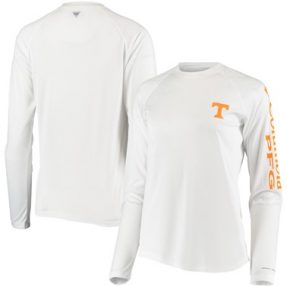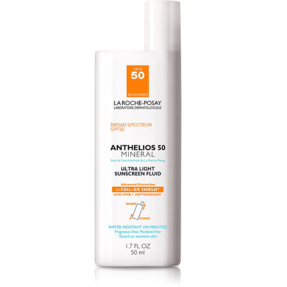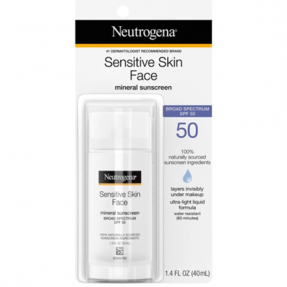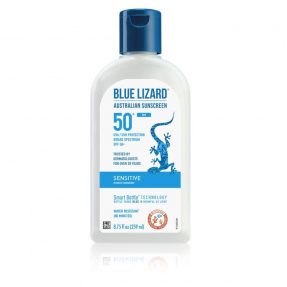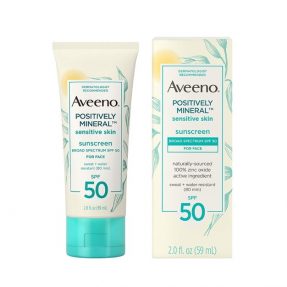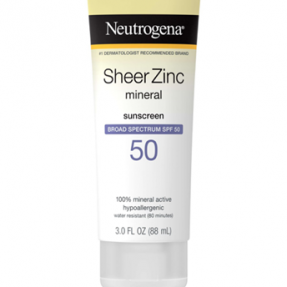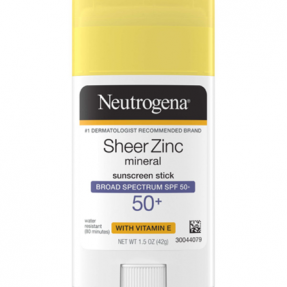By: Jason Susong, MD, FAAD
Summer will be here before you know it! We at Susong Dermatology are often asked, “What is the best sunscreen?” Here are some educational facts and our recommendations to help you select a good option for you and your family.
You need protection from both UVA and UVB rays, and zinc sunscreen fits the bill.
1) SPF matters, but it’s not the only thing
- SPF (Sun Protection Factor) relates to how well a product protects against a sunburn. SPF 30+ sunscreen is recommended, and that number roughly means you can stay out 30 times longer while wearing it before you get a sunburn. That’s a good start, but there’s a lot more to skin health and preventing skin cancer than not getting burned.
- Most sunburns relate to damage from ultraviolet B, UVB, rays (think “B for burning”), and these peak on bright sunny days when sunburn is likely.
- Most sunscreens in the US are chemicals that absorb this UVB energy, breaking down into heat, and help protect against a sunburn. If you’ve used this type of sunscreen before, you’ve probably noticed that it makes you feel more hot, and it burns if it gets in your eyes.
Are there better solutions? Consider this report of a gentleman who drove a truck for 28 years—the window glass protected him from UVB, but do you note the difference on the left side (driver’s window) of his face?
2) The reason is – UVA matters too!
- UVA is actually more present in sunshine than UVB. UVA is closer to the visible blue light in the rainbow, and carries less energy. Less energy doesn’t necessarily mean it’s safe, though.
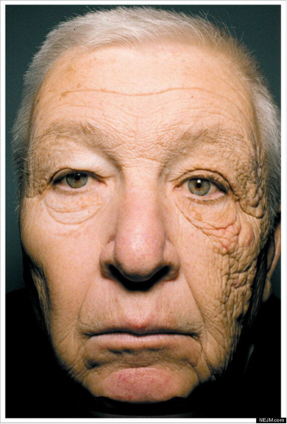
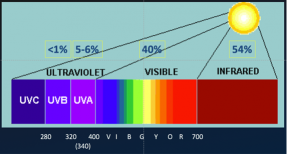
- In fact, UVA goes deeper into your skin than UVB:
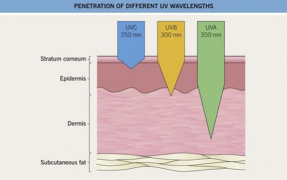
- UVA also goes through clouds and window glass.
3) UVA isn’t blocked well by many chemical sunscreens sold in the US.
- Most chemical sunscreens block UVB (to prevent sunburn), and the one good UVA chemical blocker we have, avobenzone, breaks down easily. This constant breakdown of chemicals is one of the reasons you have to reapply sunscreen.
- Zinc oxide is the red “ZnO” in the chart below, and common chemical sunscreens are represented as black lines. (A wider and taller curve is better.)
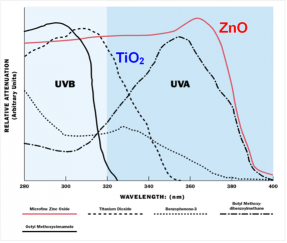
- Big difference, eh? This is just one reason why zinc is our favorite sunscreen ingredient.
4) Want some more reasons zinc is so great?
- Zinc doesn’t get absorbed through your skin. Numerous studies show that chemical sunscreens are absorbed in your bloodstream – and even measurable in your urine – after application on your skin. To date, the health implications of chemical sunscreens aren’t completely known.
- Zinc sunscreens don’t burn your eyes when you sweat.
- Zinc sunscreens are made from a metal, not a chemical. They don’t break down over time (though you should still reapply during activity as you can sweat or wash them off).
- Zinc is well tolerated on irritated or acne-prone skin (remember what you put on diaper rash? Zinc Oxide!). They are well tolerated with acne.
- If you are traveling to an area with coral reefs, zinc sunscreens are safe for the environment (many areas have banned chemical sunscreens like oxybenzone).
Because of these factors, we generally recommend zinc-based “physical” sunscreens over chemical sunscreens. They represent a smaller portion of the sunscreen market, however, and you have to search for them. Look at the “Active Ingredients” of your sunscreen for zinc.
Q: Isn’t zinc the old white pasty stuff I used to put on my nose?
A: No! Modern manufacturing has enabled nanoparticle zinc that blends into skin much better. You generally have to rub it in more to make it blend, however, and there’s not really a good “spray” option. Even so, darker skin types will note a slight dusty hue, so many sunscreens blend titanium to help with this effect, or are tinted.
Q: Don’t I need sun for Vitamin D?
A: Nope! The official recommendation from the AAD is that you supplement vitamin D (600 IU for <70 years of age) and avoid the sun. Vitamin D requires very little sun to make active and is fat soluble. More often than not, low vitamin D is related to increased waistlines rather than too little sunshine. Melanoma case rates continue to rise in part due to this misconception:
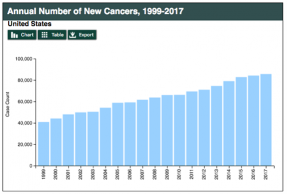
So, What Sunscreens Do We Recomment?
1) The best sunscreen isn’t sunscreen – it’s a shirt and shade! The new sunshirts (also called rash guards or fishing shirts) are very thin material that block UV, keep sweat away, and reflect the heat of the sun. You may actually feel cooler wearing one of these light colored shirts than with your shirt off (that’s why many road bikers wear these!). For exposed areas, choose a zinc-based sunscreen.
2) Some of our easily-found favorite suncreens are:
For daily wear (as an aftershave for men or under makeup for women):
For activity/sport/beach:
You can always purchase products anywhere you like. For your convenience, links are provided to representative sites. This article contains general information about medical conditions and treatments. The information is not intended to replace the specific advice or diagnosis of a physician. If you have any questions about any medical matter, consult your doctor.

